Struggling to keep up with what to post, when to post, and where it should go?
You’re not alone. The content pile-up is real, and without a system, it’s easy to miss trends, blow deadlines, or scramble for last-minute ideas.
The cost? Inconsistent messaging, disengaged followers, and campaigns that never reach full potential.
That’s where social media calendar tools change the game.
From mapping out weekly posts to syncing cross-channel campaigns, the right tool can turn your entire strategy from cluttered to cohesive.
Take Social Champ’s content calendar for example, it’s built for speed, structure, and full-team visibility. You can plan months ahead, track performance, and redirect quickly when trends shift.
And with users spending over 2.5 hours daily on social platforms in 2025, showing up consistently isn’t just smart, it’s expected.
Let’s look at the tools that will help you stay ahead, not just stay organized.
CTA: Running Late on Posts? Not Anymore.
Use Social Champ’s AI scheduler to plan and publish content at optimal times—without manual effort.
Short Summary
- Social media calendar tools help streamline planning, scheduling, and publishing across multiple platforms from one central dashboard.
- Choosing the right tool depends on your business size, team workflow, platform focus, and content strategy goals.
- Social Champ stands out with AI-powered scheduling, collaborative workflows, and in-depth analytics tailored for growth-focused teams.
- A unified calendar view in Social Champ lets you visualize, filter, and manage content across all social platforms effortlessly.
- Maximizing efficiency requires aligning content with business milestones, leveraging data-driven timing, and regularly reviewing performance insights.
What Are Social Media Calendar Tools and Why Do They Matter?
Social media calendar tools are digital platforms designed to help individuals, brands, and marketing teams plan, organize, and schedule content across multiple social channels.
Instead of manually posting in real-time or relying on fragmented reminders, these tools provide a centralized workspace where campaigns are visualized, deadlines are tracked, and content is executed with precision.
At their core, calendar tools streamline three essential aspects of social media management:
- Organization: They offer a clear overview of upcoming posts, themes, and campaigns, minimizing content gaps, repetition, and last-minute scrambles.
- Scheduling: You can queue posts days, weeks, or even months in advance. This enables consistency, improves workflow efficiency, and ensures content goes live at optimal times, even outside working hours.
- Optimization: Many tools integrate analytics to monitor engagement and performance. This data helps refine future posts based on what resonates most with your audience across platforms like Instagram, LinkedIn, Facebook, and X.
Social media calendar tools give structure to content efforts, enabling teams to operate with clarity, consistency, and a clear path toward measurable results.
Featured Article: How to Market Your Business on Social Media: 15+ Proven Strategies for Explosive Growth
Top 20 Social Media Calendar Tools for 2025 (With Pros & Cons)
The right social media calendar tool can help your team plan campaigns across channels, collaborate efficiently, and ensure no post goes live without purpose.
In this curated list, we’ve analyzed 20 of the top-performing tools that stand out for their scheduling capabilities, user experience, team features, and platform integrations.
-
Social Champ
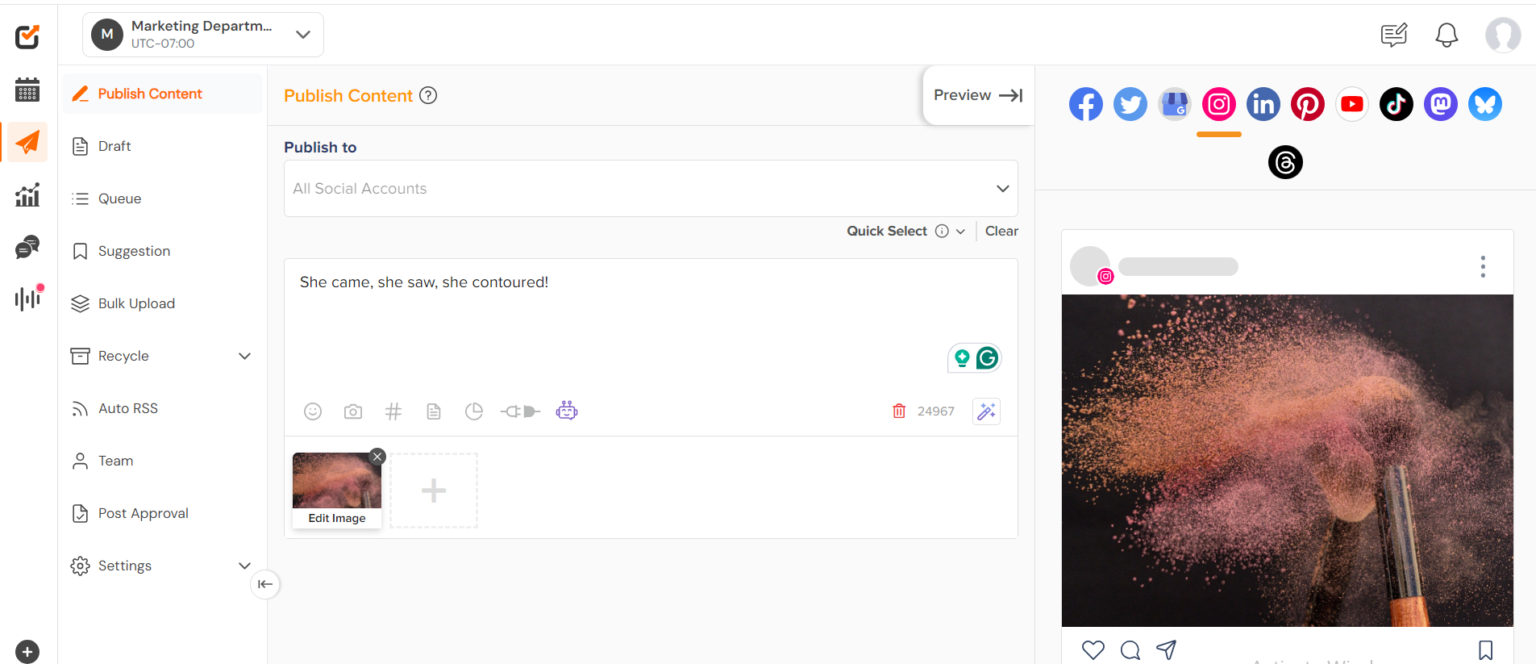
Social Champ’s Dashboard Social Champ offers an intuitive social media calendar that allows users to visualize, organize, and automate posts across multiple platforms.
It supports bulk scheduling, automated posting, and provides in-depth analytics to track performance.
The platform’s user-friendly interface streamlines the scheduling process, making it suitable for both individuals and teams.
With features like content recycling and a unified dashboard, Social Champ enhances efficiency and consistency in social media management.
Pros
- User-friendly interface
- Bulk scheduling and automation
- Comprehensive analytics
Cons
- Limited advanced features compared to some competitors
-
Notion
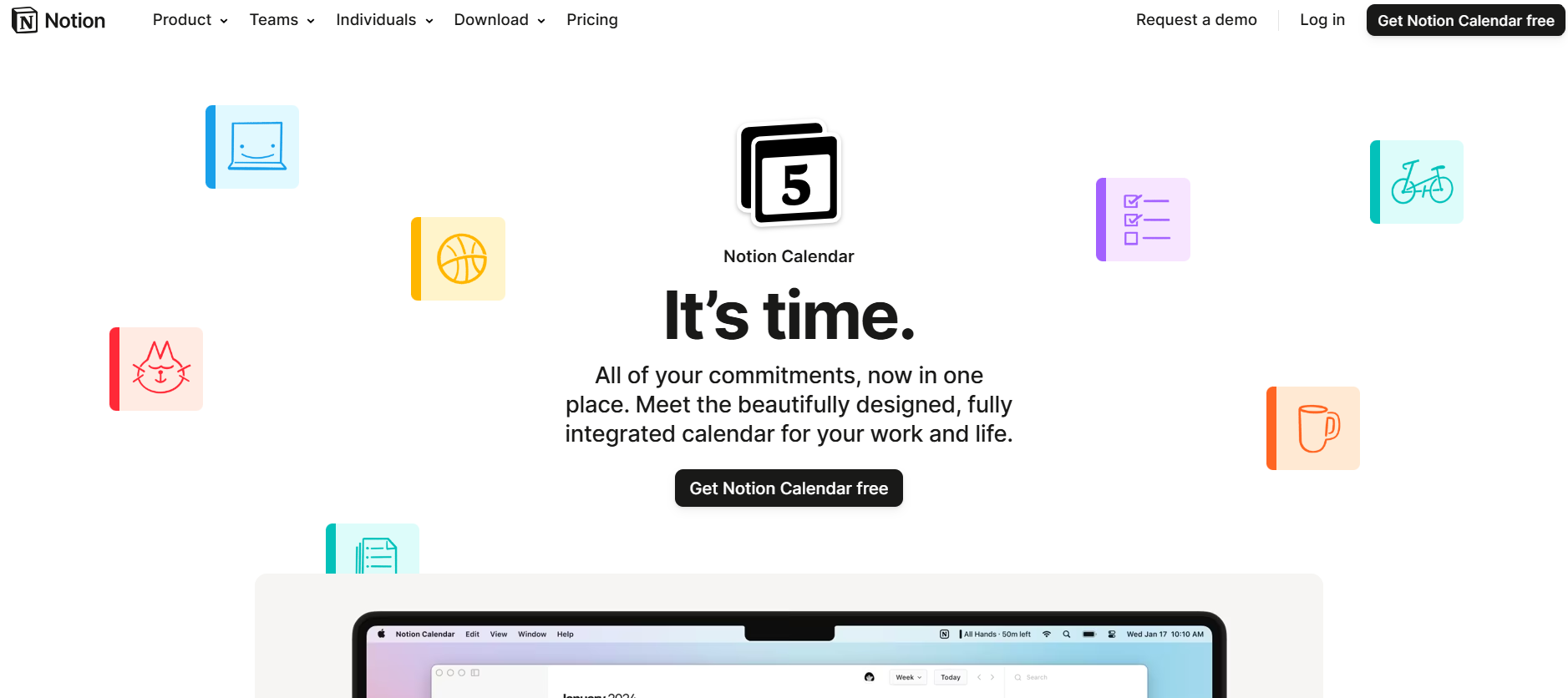
Notion’s Social Media Calendar Landing Page Notion is an all-in-one workspace that combines note-taking, task management, databases, and calendars.
Its customizable calendar feature allows users to schedule and organize tasks, events, and deadlines in one place.
Alt Text: Notion Social Media Calendar Landing Page
While Notion isn’t exclusively a social media tool, its flexibility enables users to create personalized best social media content calendars tailored to their specific needs.
Pros
- Highly customizable
- Integrates with various workflows
- Centralized information management
Cons
- Not specifically designed for social media scheduling
- Requires manual setup for social media workflows
-
Pallyy
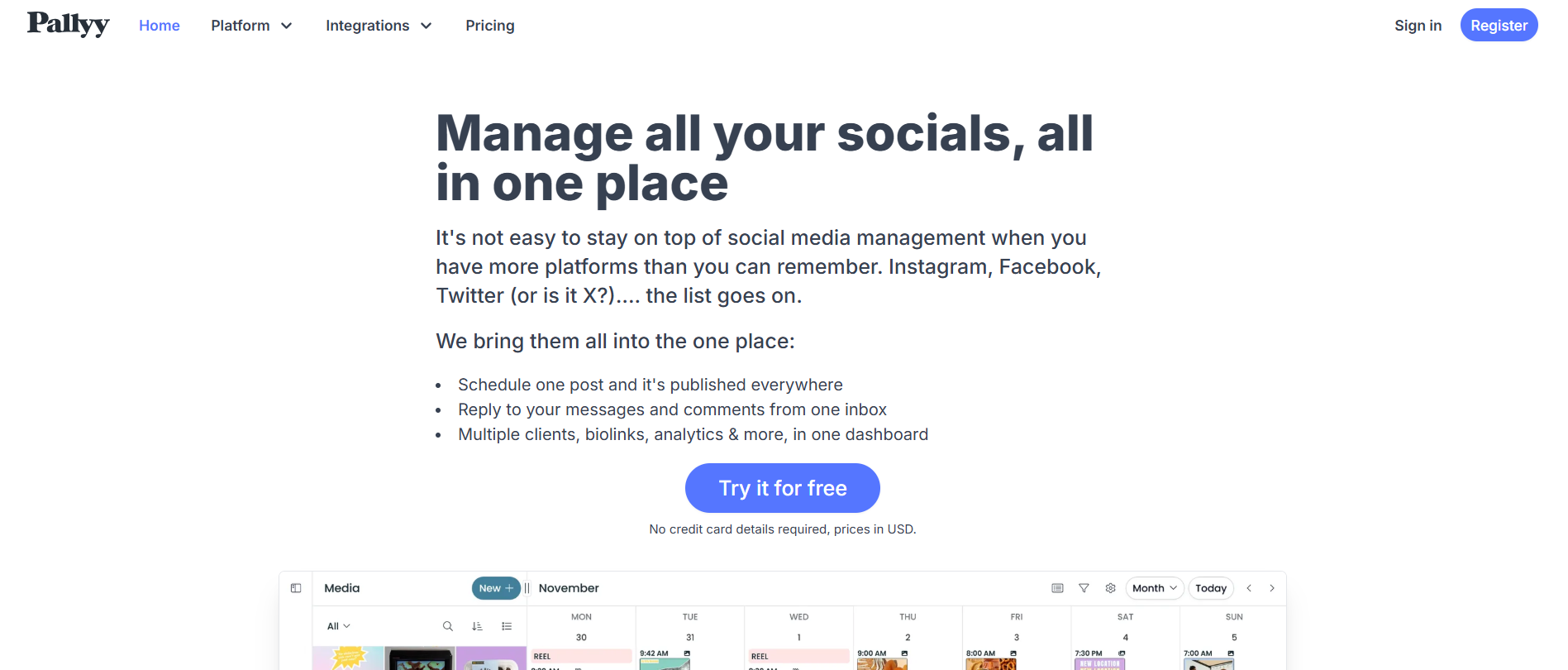
Pally Landing Page Pallyy is a social media management tool tailored for visual platforms like Instagram.
It offers features such as a drag-and-drop calendar, media library, and analytics dashboard.
Alt Text: Pally Landing Page
Pallyy supports scheduling across multiple platforms, including Facebook, Twitter, LinkedIn, and TikTok.
Its user-friendly interface and affordable pricing make it ideal for freelancers and small businesses.
Pros
- Easy-to-use interface
- Affordable pricing
- Supports multiple platforms
Cons
- Limited advanced features for larger teams
- Primarily focused on visual content
-
StoryChief
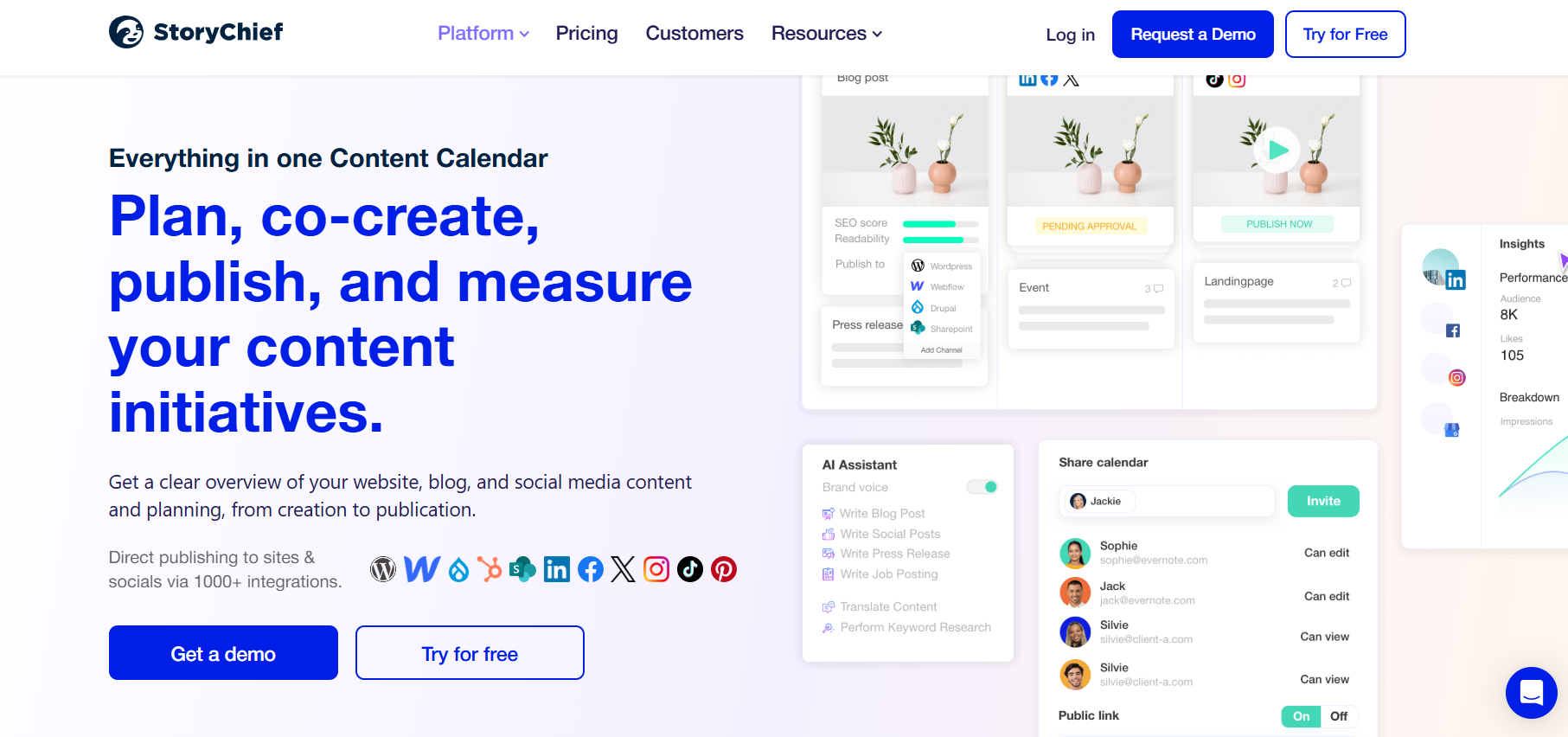
Story Chief Landing Page StoryChief is a content marketing platform that simplifies social media planning, content creation, and distribution.
Alt Text: Story Chief Landing Page
It features a centralized calendar to schedule and organize publishing timelines, ensuring campaigns stay on track.
With performance analytics and social media integration, StoryChief helps teams expand their audience reach and refine strategies based on engagement metrics.
Pros
- Centralized content planning
- Integrated analytics
- Direct social media publishing
Cons
- May lack advanced features for large enterprises
- The interface may have a learning curve for new users
-
MeetEdgar
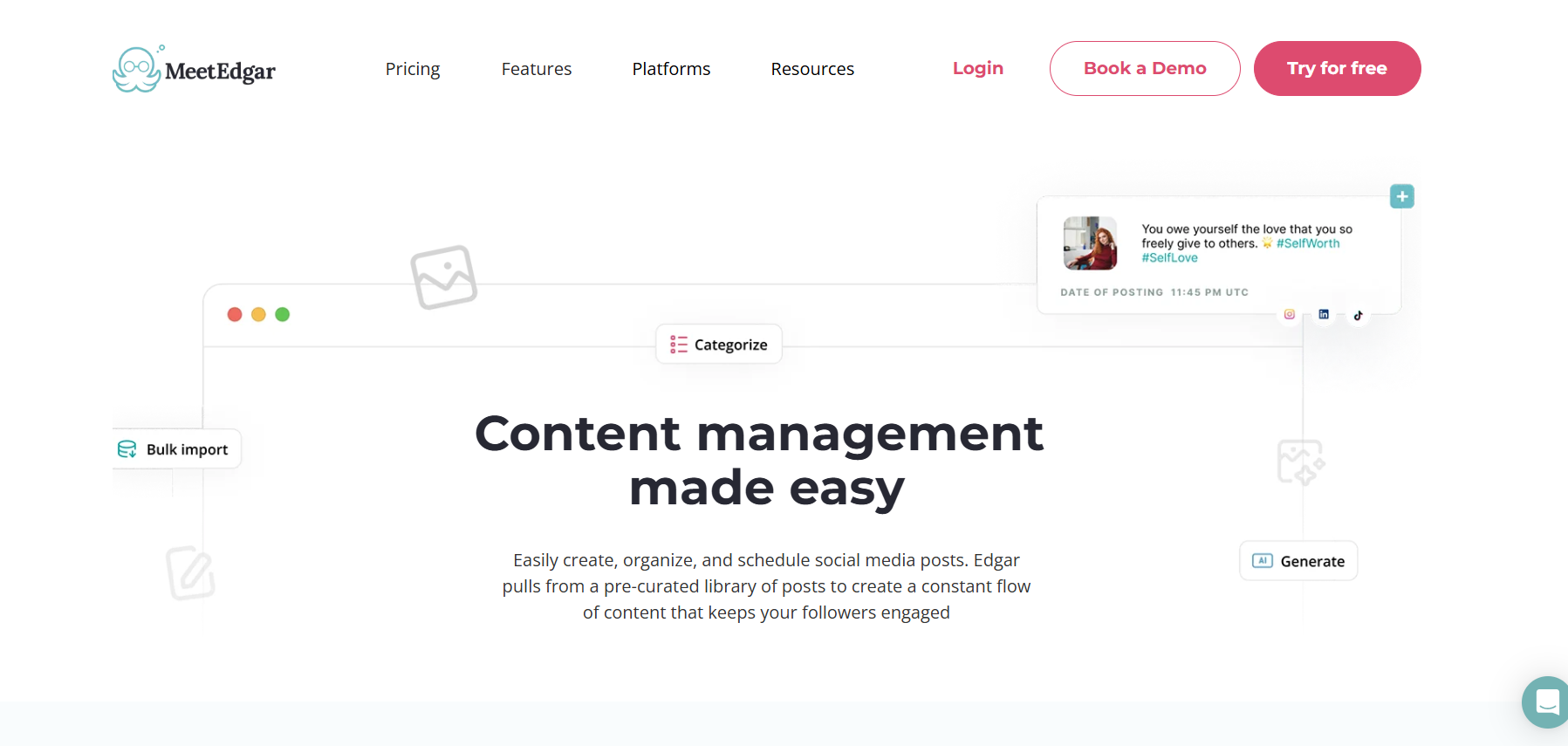
MeedEdgar Content Management Homepage MeetEdgar is designed to automate content scheduling and recycling, making it ideal for evergreen content strategies.
Alt Text: MeedEdgar Content Management Homepage
It features a content library, customizable scheduling, and analytics to track performance.
MeetEdgar supports multiple social media platforms and offers an intuitive interface, making it suitable for small businesses and solo entrepreneurs.
Pros
- Excellent content recycling capabilities
- User-friendly interface
- Supports multiple platforms
Cons
- Limited advanced features compared to competitors
- No free plan option
-
Planable
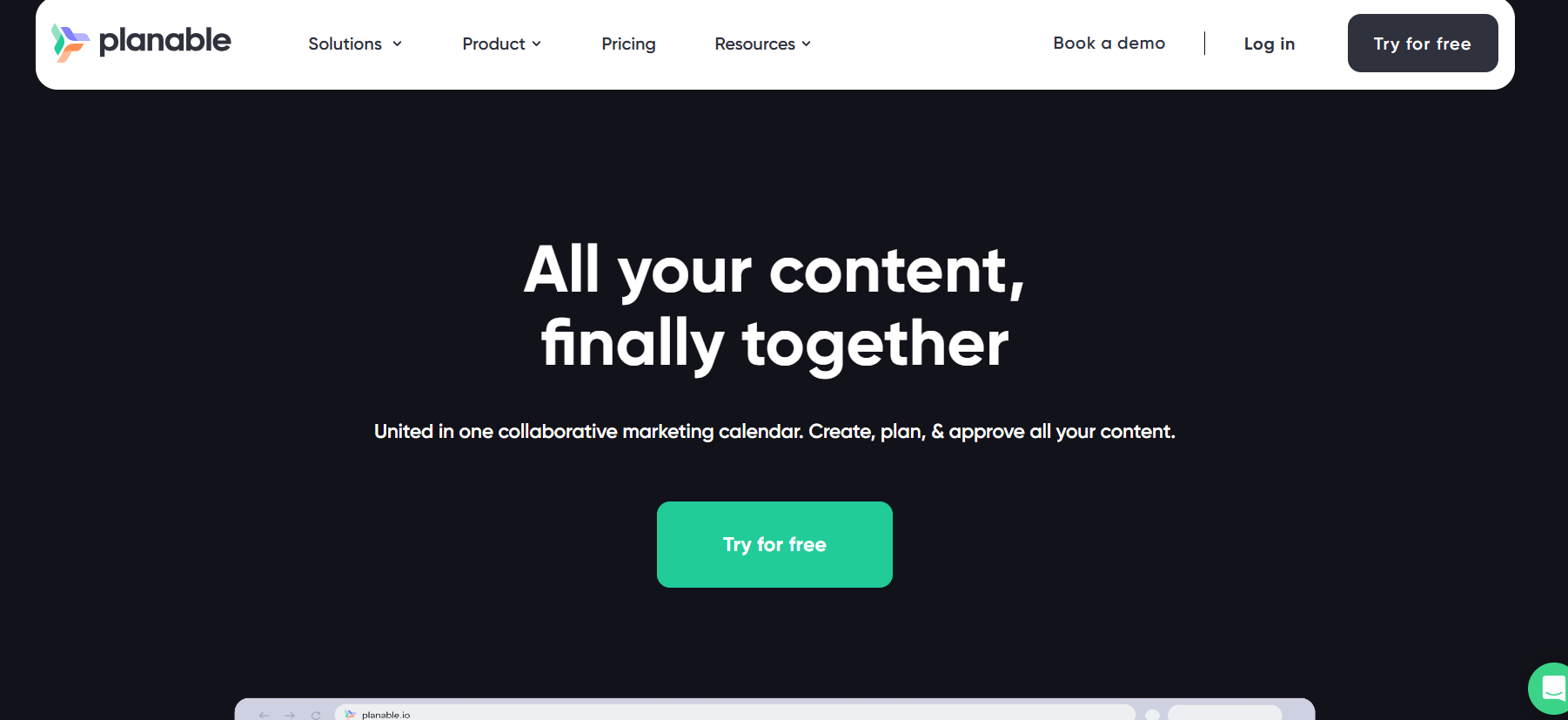
Planable Social Media Calender Homepage Planable is a collaborative platform designed to enhance workflow for teams as a social media content planner.
Alt Text: Planable Social Media Calender Homepage
Its intuitive calendar visually displays scheduled content, making it easier to maintain a consistent posting strategy.
Planable allows marketing professionals to organize, schedule, and approve posts across multiple accounts from a single interface.
Pros
- Visual content calendar
- Streamlined collaboration and approval process
- Supports multiple accounts
Cons
- Limited integrations compared to some competitors
- May require onboarding for new users
-
CoSchedule
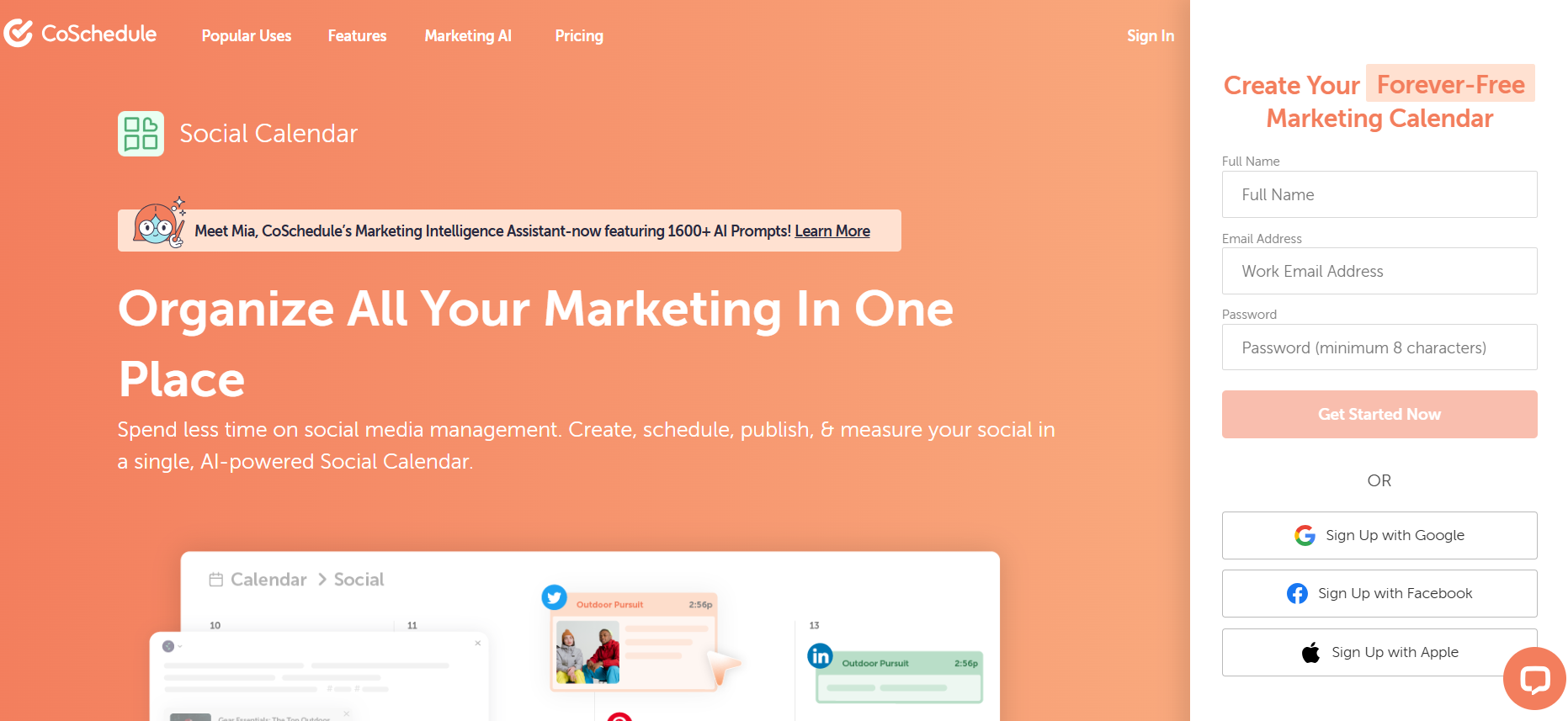
CoSchedule Social Media Calendar Landing Page CoSchedule offers a robust social calendar featuring tools to create, schedule, publish, and measure your social strategy.
Alt Text: CoSchedule Social Media Calendar Landing Page
It provides an integrated marketing calendar that allows users to plan all marketing projects in one place, including social media posts, blog content, and email campaigns.
Pros
- Comprehensive marketing calendar
- Integrates various marketing activities
- Suitable for teams and agencies
Cons
- Higher-priced tiers may be costly for small businesses
- Some users report a learning curve
-
ContentStudio
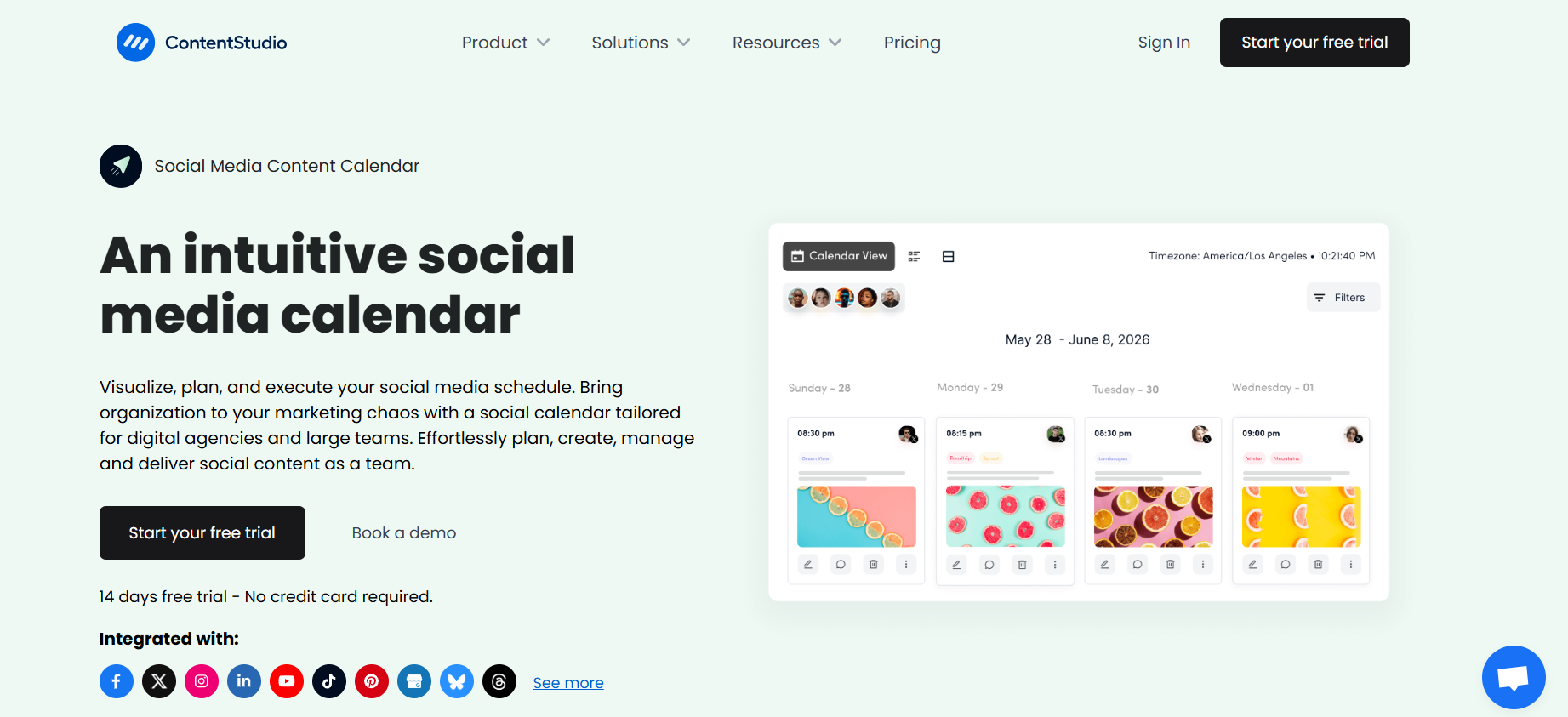
ContentStudio Social Media Content Calendar Landing Page ContentStudio is a social media calendar tool that helps users create, schedule, and share content on multiple platforms.
Alt Text: Content Studio Social Media Content Calendar Landing Page
It offers an easy-to-use interface to plan and manage social media campaigns, with features like content curation, collaboration tools, and in-depth analytics.
Pros
- User-friendly interface
- Robust scheduling and content curation features
- Collaborative tools for teams
Cons
- May lack some advanced features for large enterprises
- Pricing may be higher compared to basic tools
-
Loomly
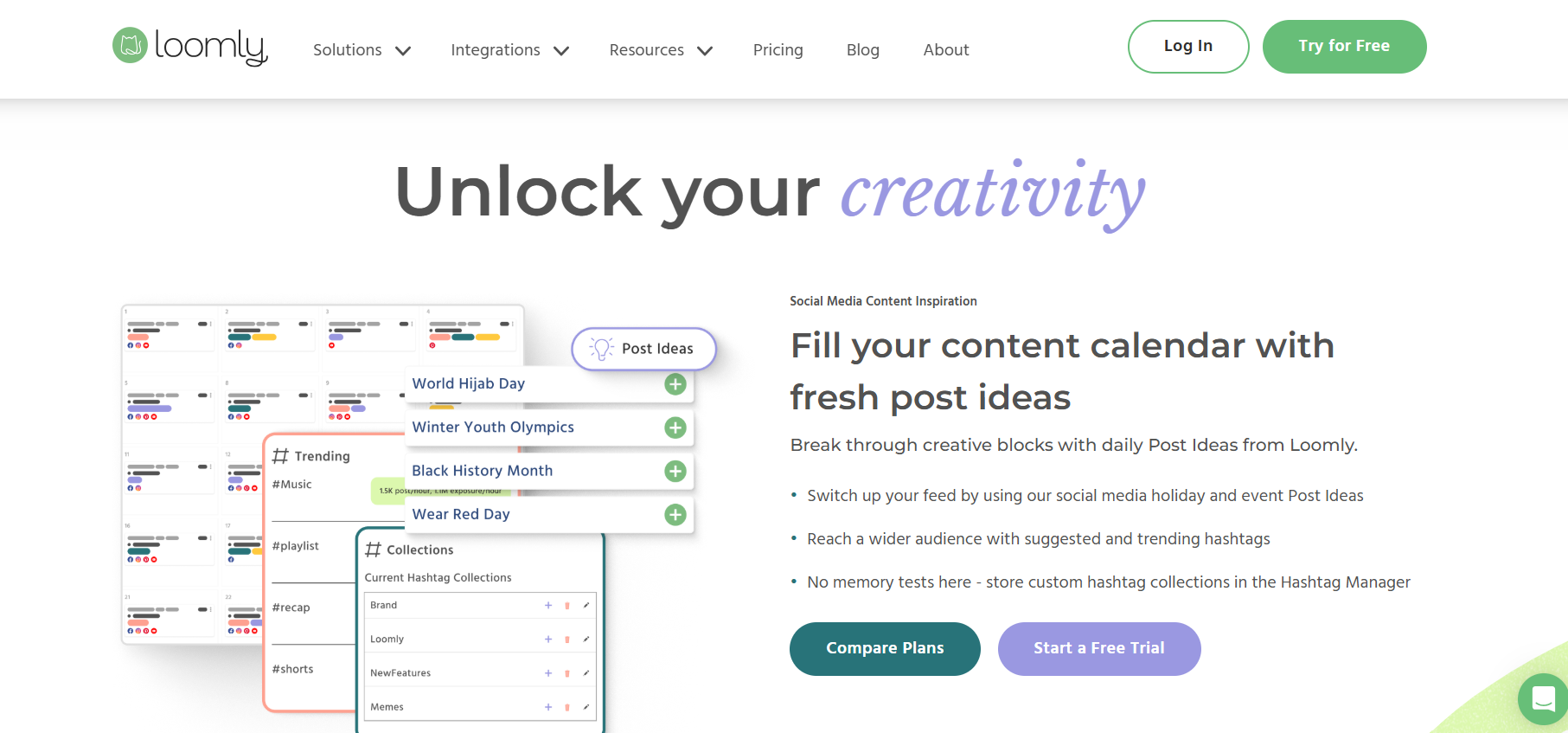
Loomly Landing Page for Social Media Content Calendar Loomly is a brand success platform that helps marketing teams create, schedule, and manage content across various social media platforms.
Alt Text” Loomly Landing Page for Social Media Content Calendar
It offers features like post ideas, optimization tips, automated publishing, and analytics to track performance.
Loomly’s intuitive interface makes it suitable for teams seeking a streamlined content workflow.
Pros
- Content suggestions and optimization tips
- Automated publishing
- Comprehensive analytics
Cons
- Limited integrations compared to some competitors
- Pricing may be higher for small teams
-
Buffer
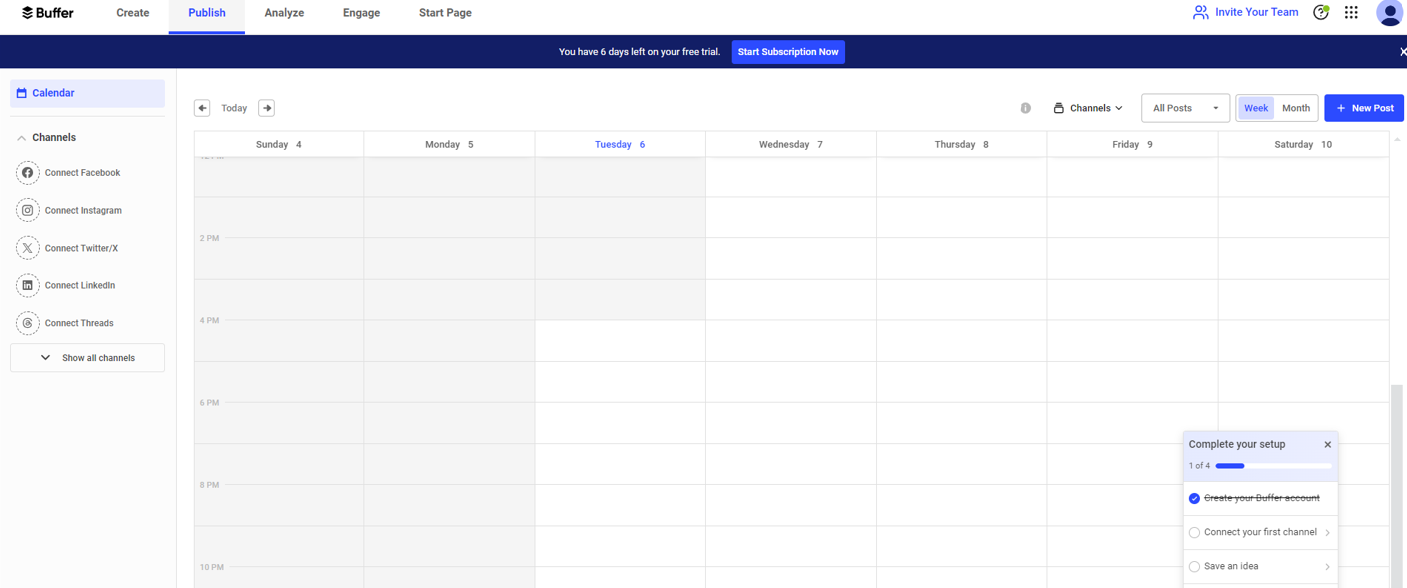
Buffer’s Dashboard Buffer is a social media management tool that allows users to schedule posts, analyze performance, and manage all accounts in one place.
Alt Text: Buffer Landing Page
It offers a clean interface, browser extensions, and mobile apps, making it accessible for users on the go.
Buffer supports various platforms, including Facebook, Twitter, LinkedIn, and Instagram.
Pros
- User-friendly interface
- Supports multiple platforms
- Affordable pricing plans
Cons
- Limited advanced features for large teams
- Analytics may not be as comprehensive as some competitors
-
Hootsuite
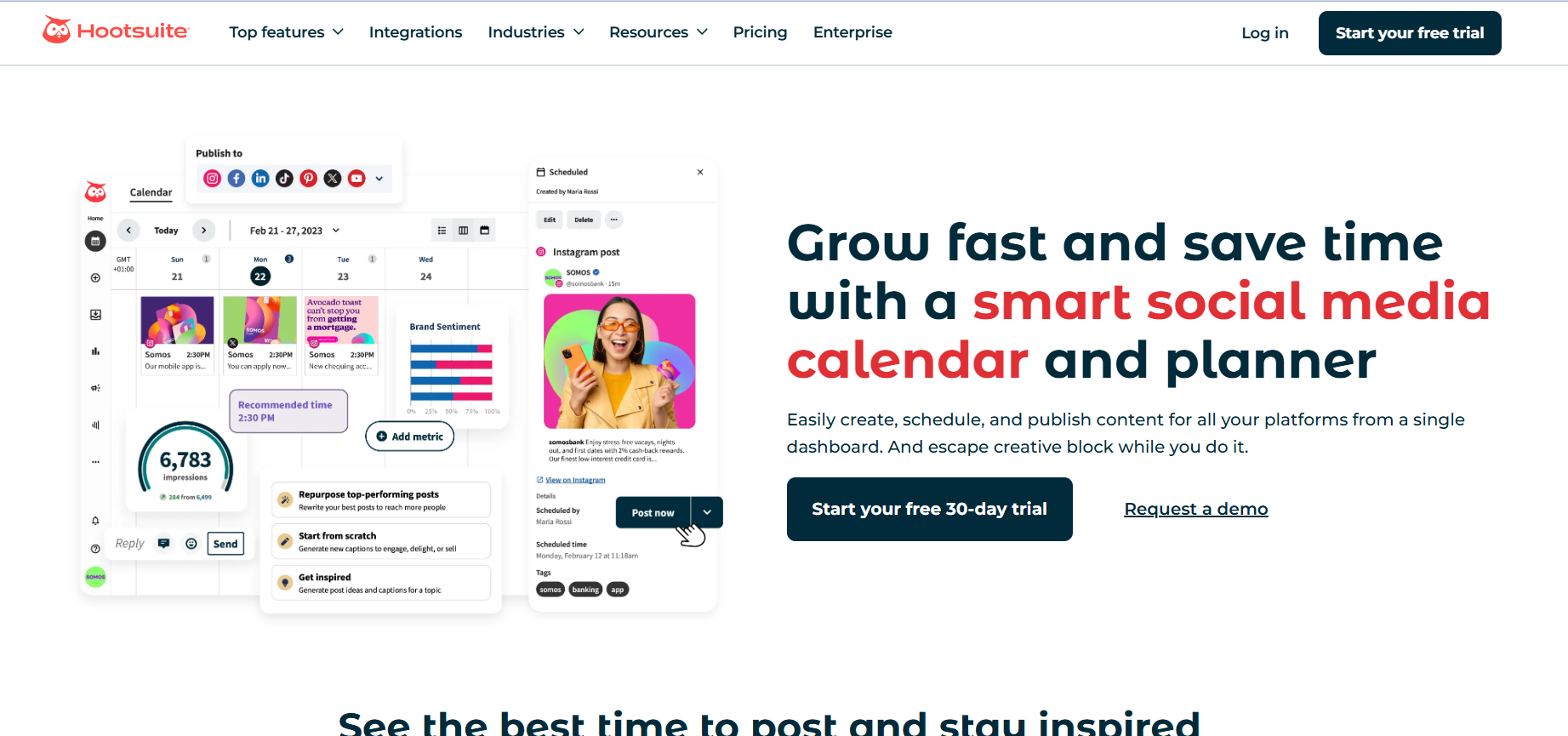
Hootsuite’s Landing Page Hootsuite is a comprehensive social media management platform that integrates scheduling, content creation, analytics, and social listening into one interface.
Its robust calendar feature allows users to plan and visualize posts across multiple networks, ensuring a cohesive strategy.
With over 100 integrations, Hootsuite offers unparalleled flexibility, catering to businesses of all sizes.
Its AI-driven tools assist in automating various aspects of social media management, enhancing efficiency and effectiveness.
Pros
- Extensive integration library
- AI-powered automation features
- Comprehensive analytics and reporting
Cons
- Higher pricing tiers may be costly for small businesses
- Learning curve for new users
-
Later
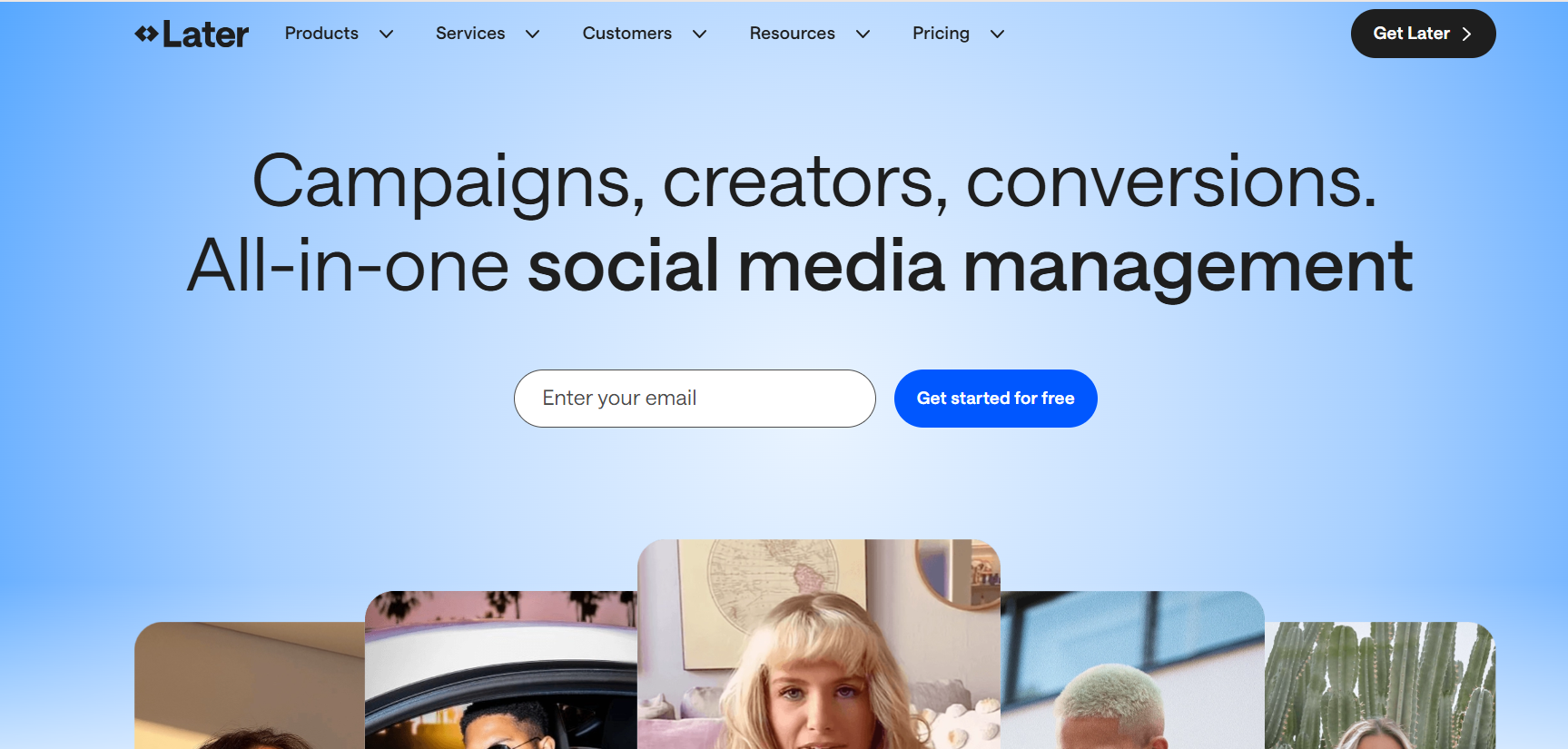
Later Homepage Later is a visual content calendar tool designed to streamline social media planning and scheduling.
Alt Text: Later Homepage
It supports multiple platforms, including Instagram, TikTok, Facebook, YouTube, LinkedIn, Pinterest, and X.
Later’s intuitive interface allows users to preview and rearrange upcoming posts, ensuring a cohesive feed.
Features like media storage, team collaboration, and performance analytics make it a comprehensive solution for content creators and marketers.
Pros
- Visual planner for cohesive feed design
- Supports multiple social platforms
- Team collaboration features
Cons
- Advanced features may require higher-tier plans
- Limited functionality for non-visual content
-
Sprout Social
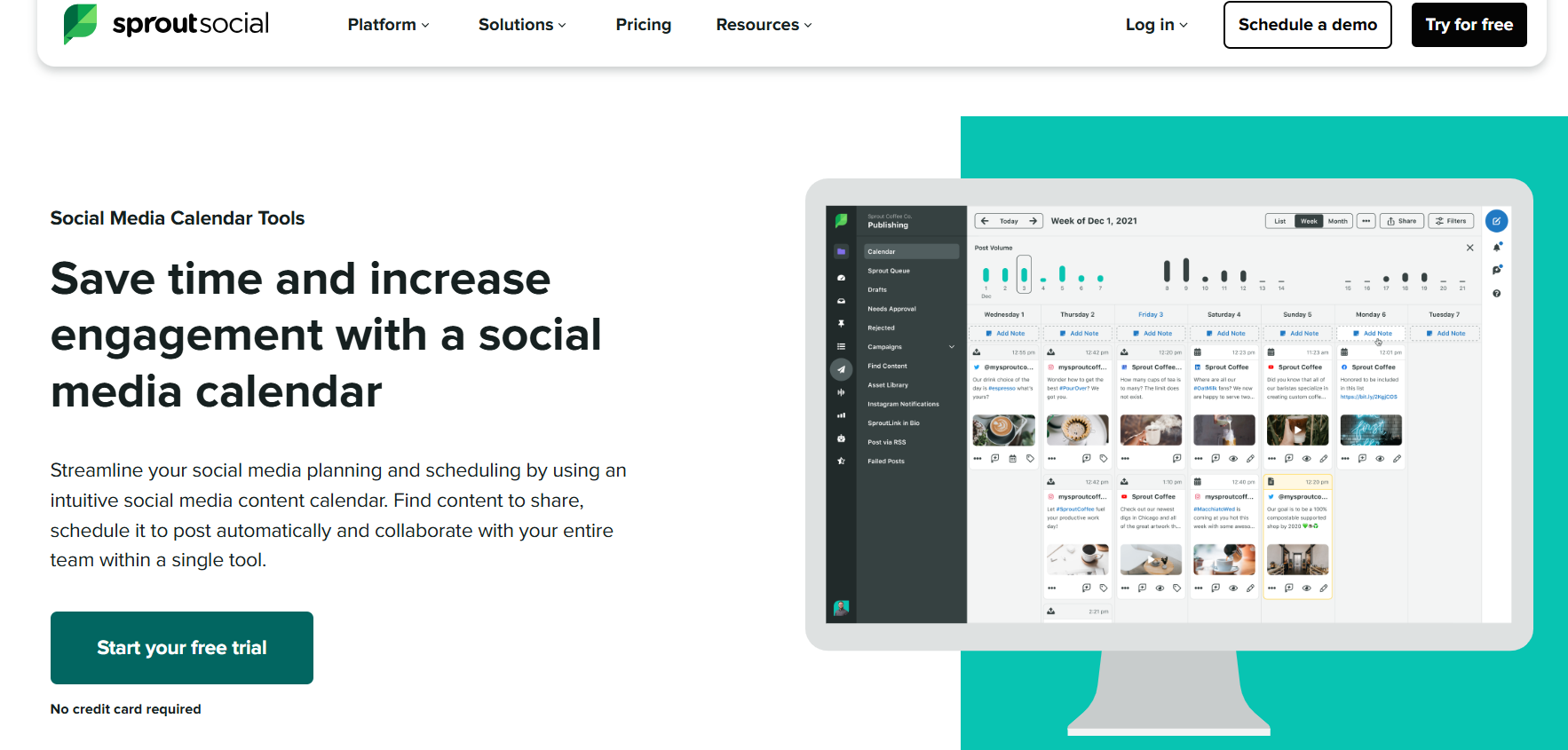
Sprout Social Social Media Calendar Landing Page Sprout Social offers a centralized platform for managing and scheduling social media content across various networks.
Alt Text: Sprout Social Social Media Calendar Landing Page
Its calendar feature provides a clear overview of scheduled posts, facilitating strategic planning.
Sprout Social integrates with platforms like X, Facebook, LinkedIn, Instagram, Pinterest, YouTube, and Google My Business, ensuring broad reach.
The platform also offers robust analytics and reporting tools to measure performance and inform future strategies.
Pros
- Comprehensive platform integration
- Robust analytics and reporting tools
- User-friendly interface
Cons
- Premium pricing may be prohibitive for small businesses
- Some features may be complex for new users
-
Sendible
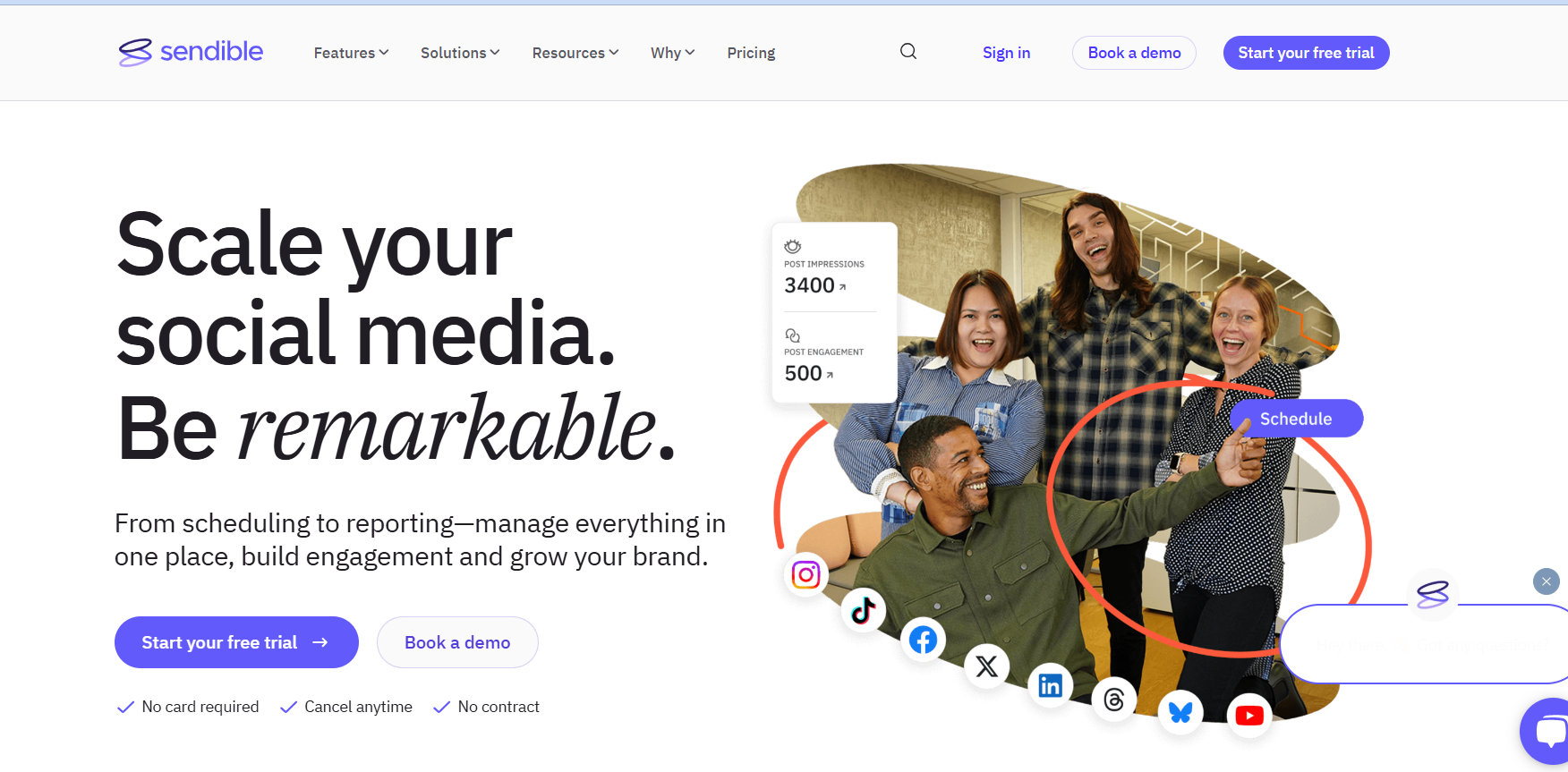
Sendible Homepage Sendible is a social media management tool designed for agencies and businesses to plan, schedule, and optimize posts across various channels.
Alt Text: Sendible Homepage
Its calendar feature allows for tailored content scheduling, ensuring peak engagement.
Sendible supports collaboration among team members, making it suitable for larger organizations.
The platform also offers analytics to track performance and inform strategy adjustments.
Pros
- Tailored content scheduling
- Team collaboration features
- Performance analytics
Cons
- Limited scheduling and analytics features compared to some competitors
- May require onboarding for new users
-
Zoho Social
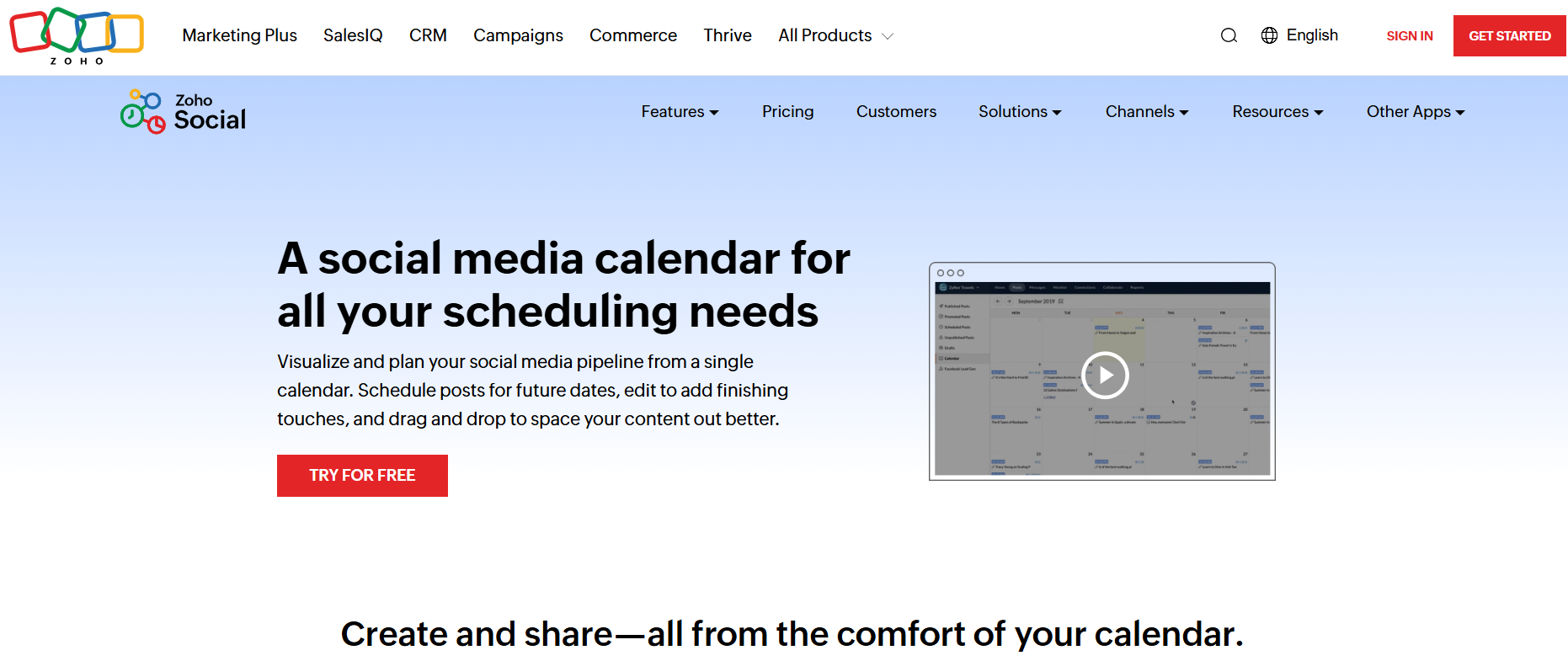
Zoho Social Social Media Calendar Homepage Zoho Social provides a comprehensive suite for social media management, including a visual publishing calendar, monitoring dashboard, and analytics.
Alt Text: Zoho Social Social Media Calendar Homepage
Its calendar allows users to plan and schedule posts, with drag-and-drop functionality for easy adjustments.
Zoho Social supports multiple platforms and offers features like bulk scheduling and real-time engagement tracking, making it suitable for businesses aiming to maintain an active social media presence.
Pros
- Intuitive publishing calendar
- Real-time engagement tracking
- Bulk scheduling capabilities
Cons
- Limited advanced features for large enterprises
- The interface may have a learning curve for new users
-
Post Planner
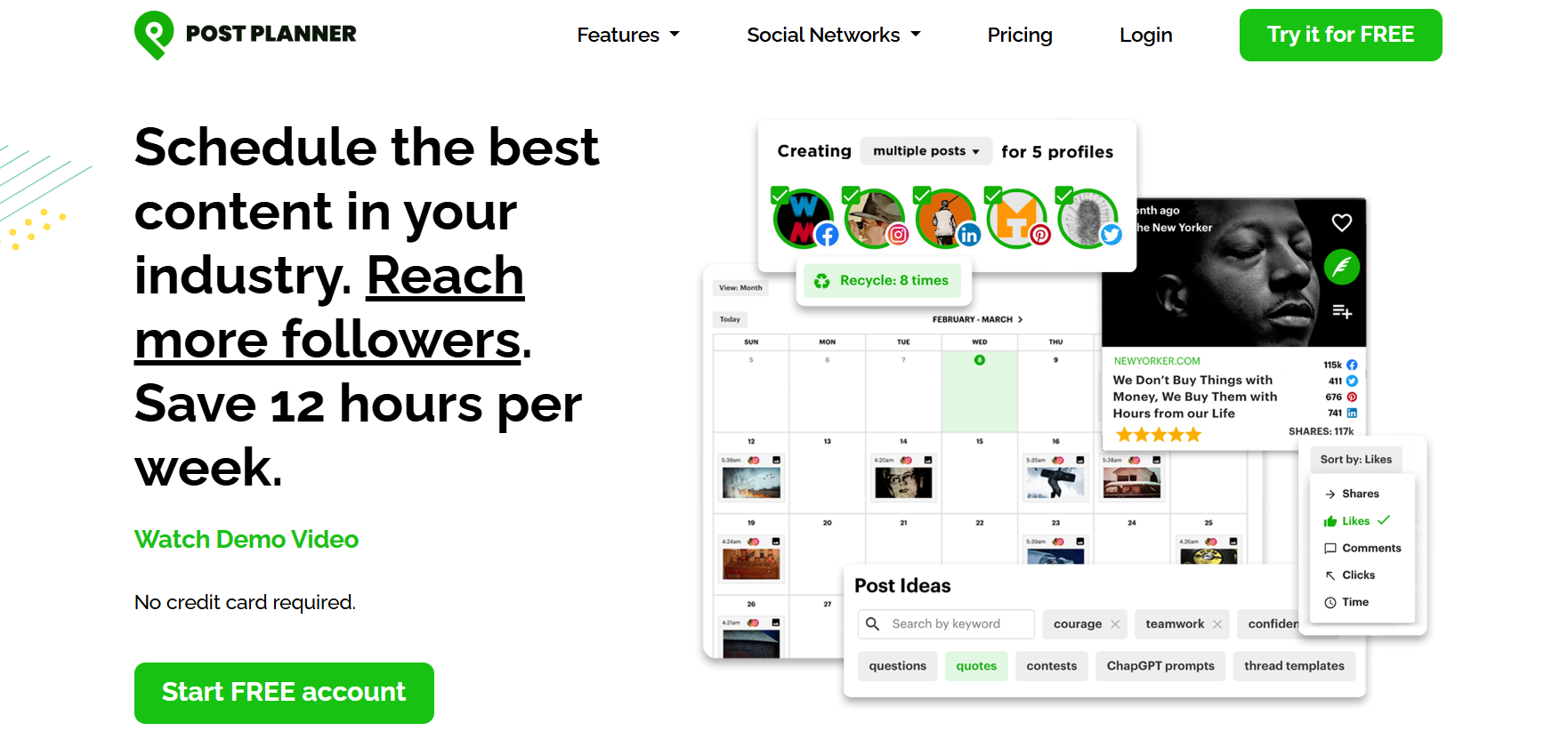
Post Planner Landing Page Post Planner is a social media scheduler focused on maximizing engagement through curated content.
Alt Text: Post Planner Landing Page
It allows users to discover top-performing content in their niche and automate posting schedules.
Post Planner supports multiple platforms and offers AI-powered features to assist in crafting captions and selecting hashtags, making it a valuable tool for content creators aiming to boost audience interaction.
Pros
- Content discovery features
- AI-powered caption and hashtag suggestions
- Automated posting schedules
Cons
- Limited platform integrations compared to competitors
- May not suit complex campaign strategies
-
Tailwind
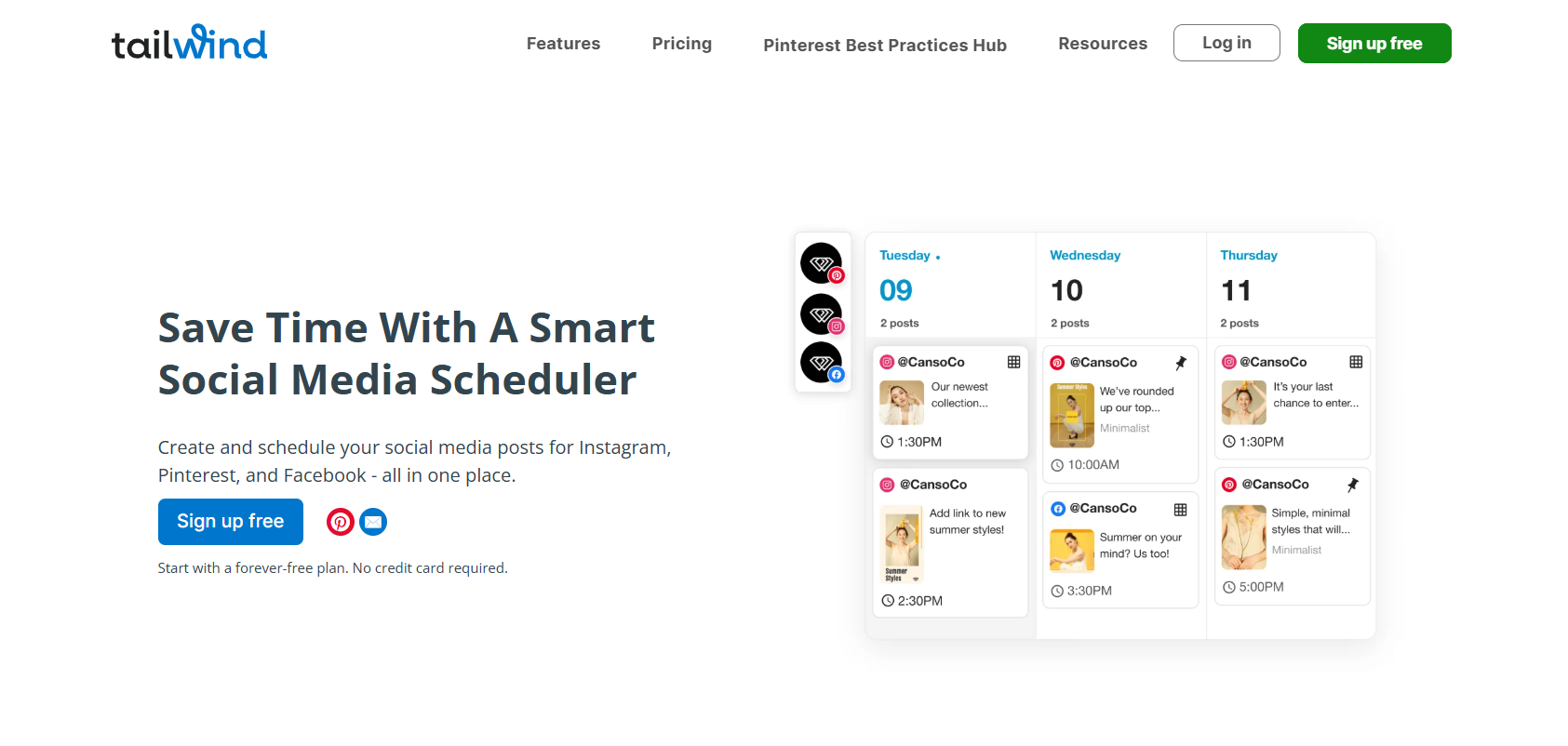
Tailwind Homepage Tailwind specializes in scheduling and optimizing content for visual platforms like Instagram, Pinterest, and Facebook.
Alt Text: Tailwind Homepage
It offers features like auto-publishing, content creation tools, and bulk editing.
Tailwind’s collaborative tools enable teams to coordinate the best social media content calendars and track campaign outcomes, enhancing efficiency and client reporting accuracy.
Pros
- Auto-publishing capabilities
- Collaborative tools for teams
- Bulk editing features
Cons
- Primarily focused on visual content platforms
- Limited functionality for non-visual content
-
SocialPilot
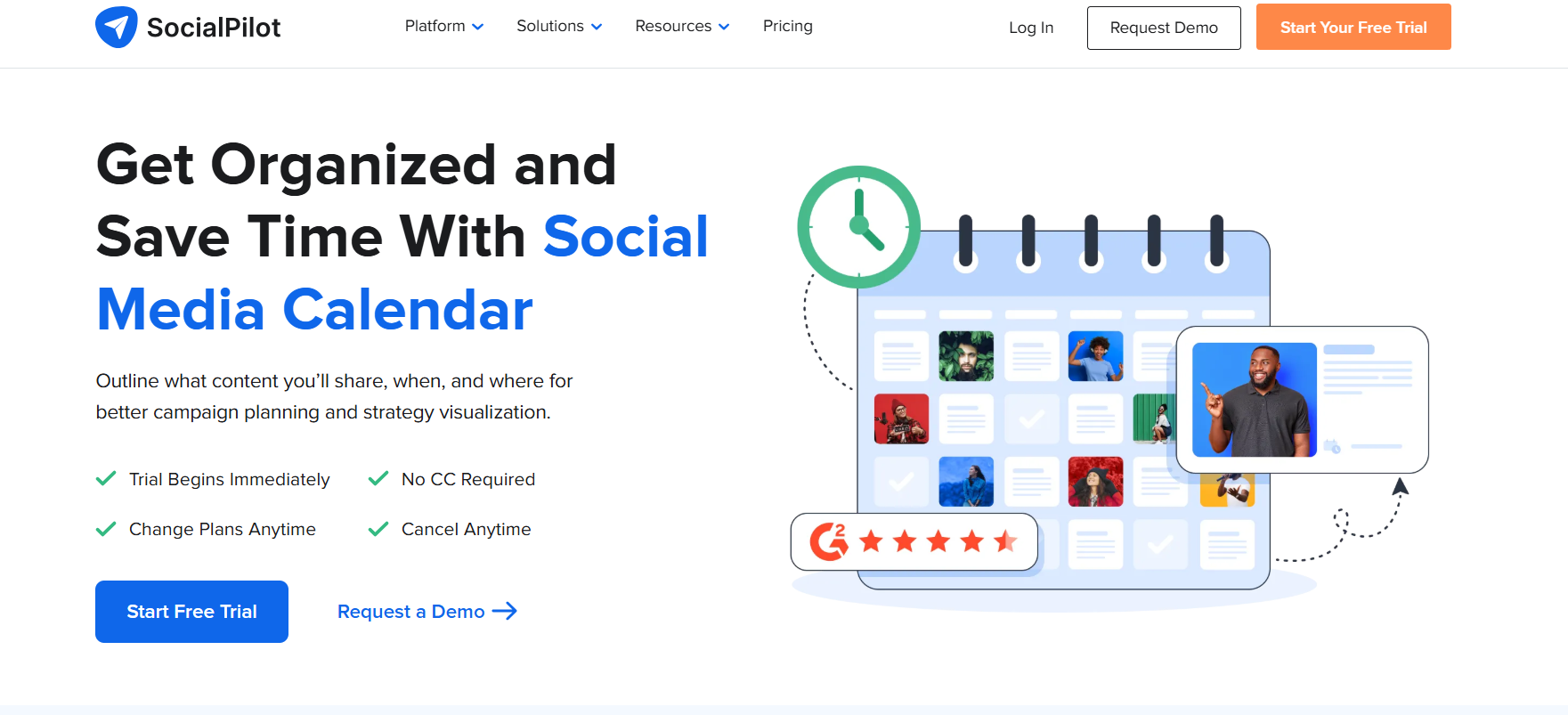
SocialPilot Social Media Calendar Landing Page SocialPilot is a social media management tool that helps agencies and brands grow their presence on social media.
Alt Text: Social Pilot Social Media Calendar Landing Page
It offers a content calendar to plan, organize, and visualize content strategy.
SocialPilot supports features like bulk scheduling, team collaboration, and white-label solutions, making it suitable for businesses aiming to scale their social media marketing efforts.
Pros
- Comprehensive content calendar
- Bulk scheduling capabilities
- Team collaboration features
Cons
- Advanced features may require higher-tier plans
- The interface may require onboarding for new users
-
Onlypult
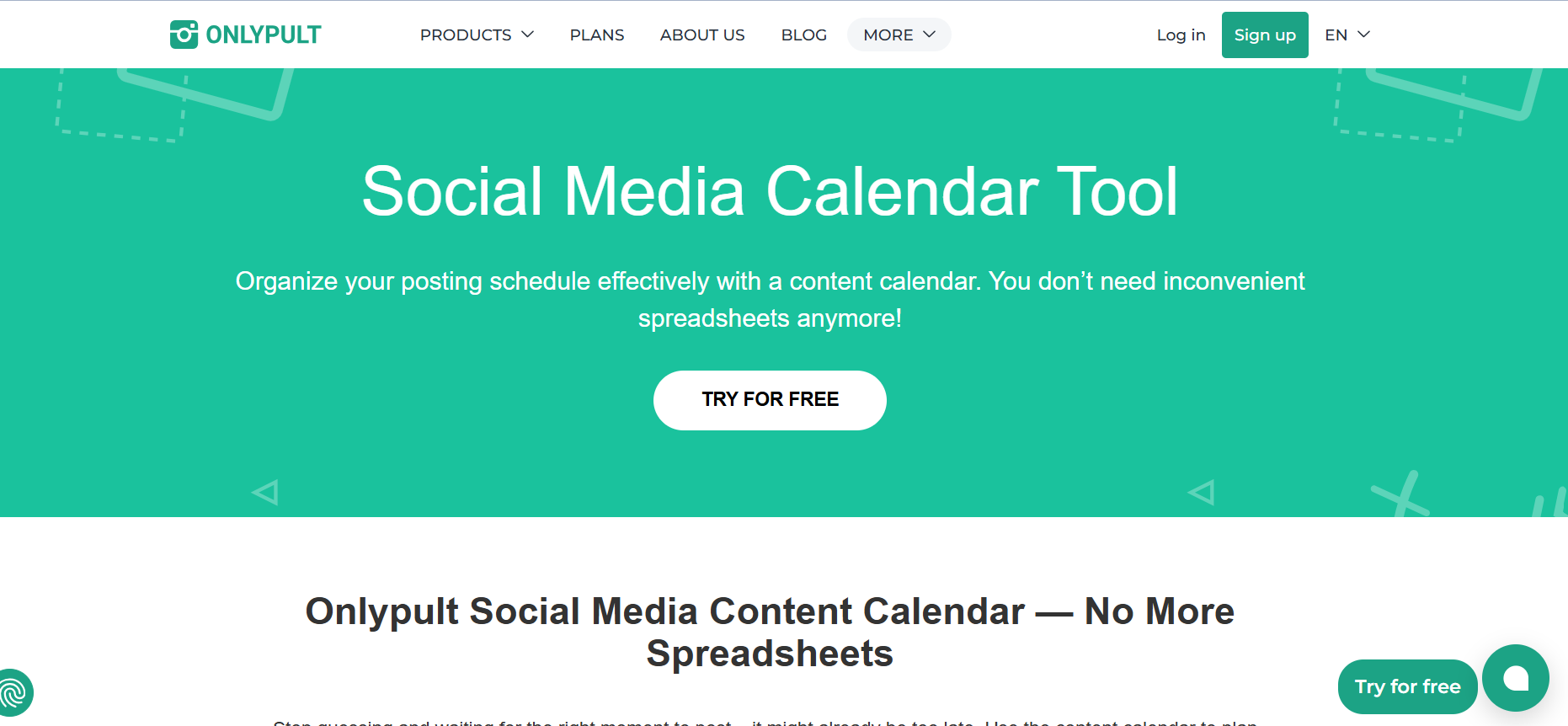
Onlypult Social Media Calendar Landing Page Onlypult is a social media management platform that allows users to schedule posts, analyze performance, and manage multiple accounts from a single dashboard.
Alt Text: Onlypult Social Media Calendar Landing Page
It supports various platforms and offers features like content planning, analytics, and team collaboration, making it suitable for businesses and agencies managing multiple clients.
Pros
- Multi-account management
- Comprehensive analytics
- Team collaboration features
Cons
- Limited integrations compared to competitors
- The interface may have a learning curve for new users
-
Agorapulse
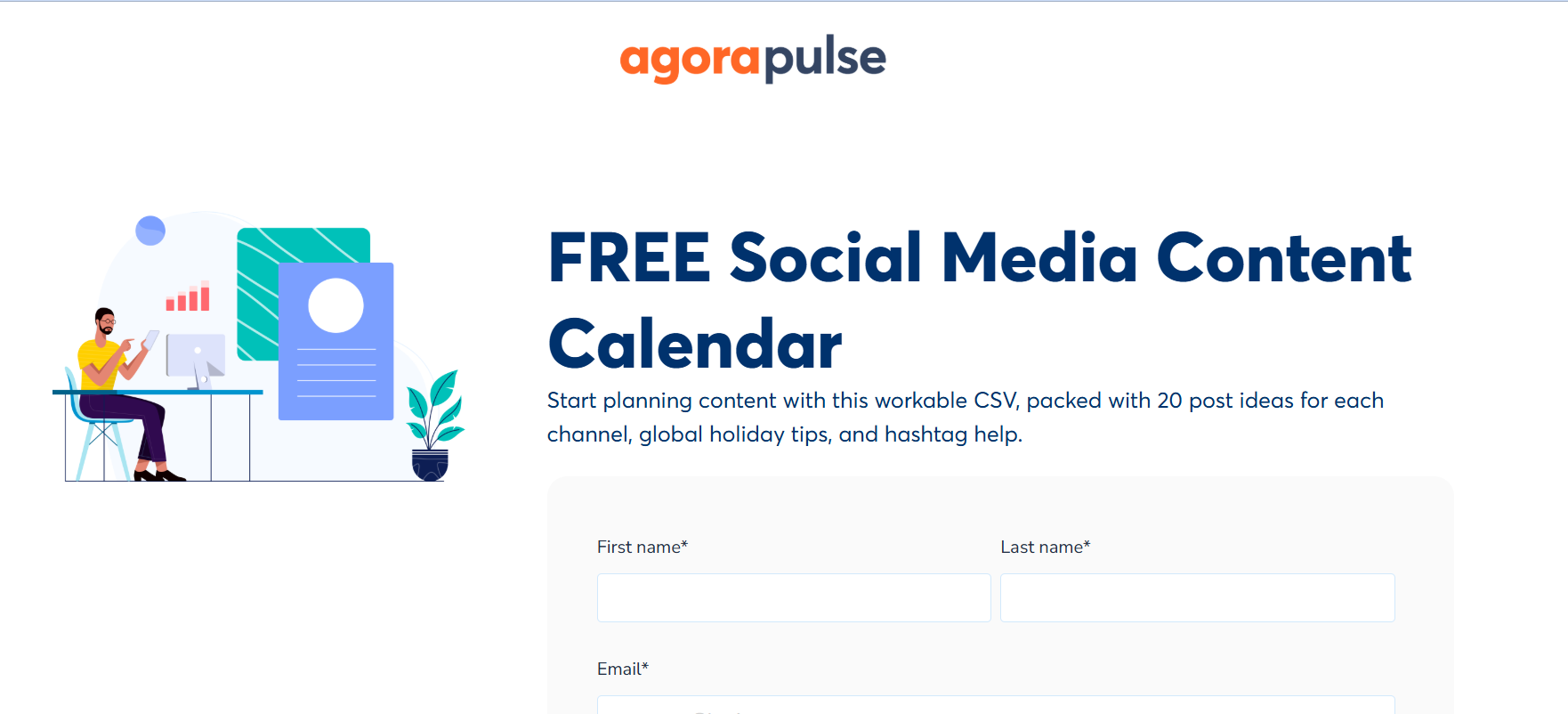
Agorapulse Social Media Calendar Landing Page Agorapulse is a social media management tool that offers scheduling, monitoring, and reporting features.
Alt Text: Agorapulse Social Media Calendar Landing Page
Its content calendar provides a clear overview of scheduled posts, facilitating strategic planning.
Agorapulse supports various platforms and offers features like social inbox, team collaboration, and detailed analytics, making it suitable for businesses aiming to streamline their social media operations.
Pros
- Comprehensive scheduling and monitoring features
- Detailed analytics and reporting
- Team collaboration capabilities
Cons
- Premium pricing may be prohibitive for small businesses
- Some features may be complex for new users
These tools offer a range of features to cater to different business needs and sizes. Selecting the right one depends on your specific requirements, team size, and budget.
CTA: Overwhelmed by Content Approvals? Simplify It.
Social Champ’s built-in approval workflows make team collaboration smooth, structured, and error-free.
How to Choose the Right Social Media Calendar Tool for Your Business
Choosing the right social media calendar tool can feel overwhelming because there are so many options, each promising to make your life easier.
But not every tool fits every business.
The key is to find one that matches your company’s size, your specific goals, and how your team works.
Picking the wrong tool could mean wasted time, money, or missed opportunities.
This guide will help you make an informed choice so you can keep your social media organized, consistent, and effective in 2025 and beyond.
-
Understand Your Business Size and Team Needs
One of the first things to consider is how big your business is and how many people will use the tool.
Solo Entrepreneurs and Small Businesses
- If you’re managing your social media alone or have a small team, simplicity and affordability are crucial.
- You’ll want a tool that’s easy to learn and use, without features you don’t need.
- Look for straightforward scheduling, basic analytics, and the ability to manage a few social accounts.
- Tools like Social Champ, Buffer, and Pallyy fit well here because they offer essential functions without overwhelming complexity.
Medium-Sized Teams
- If your marketing team has several members, collaboration becomes important.
- You’ll need tools that let multiple users plan, review, and schedule content smoothly.
- Features like content approval workflows, team roles, and shared calendars are valuable.
- Tools such as Content Studio, Loomly, and CoSchedule provide these collaboration features while still being user-friendly.
Large Enterprises
- For big companies, social media management can be complex, often involving multiple brands, campaigns, and departments.
- Tools must support advanced scheduling, in-depth analytics, multiple user roles, and integrations with other business software.
- Platforms like Hootsuite, Sprout Social, and Agorapulse cater to these needs, offering scalability and robust team management features.
-
Clarify Your Content Goals and Strategy
Knowing what you want to achieve with your social media presence will help you choose a calendar tool with the right features.
Focus on Visual Content
- If your business relies heavily on Instagram, Pinterest, or TikTok, a tool with a strong visual planner is vital.
- These tools let you preview how your posts will look before they go live, ensuring a cohesive brand image.
- Later and Tailwind excel at this by offering drag-and-drop calendar views and visual grids.
Volume and Frequency
- If your strategy involves posting very frequently or across many channels, you need a tool that handles bulk scheduling and multi-account management smoothly.
- Social Champ is a good option here, allowing you to upload and schedule large batches of posts at once, saving time.
Content Variety
- For businesses publishing various types of content, blogs, videos, stories, and ads, you’ll want a calendar that supports mixed media and offers flexibility.
- StoryChief and CoSchedule allow for diverse content types and integrate well with content marketing workflows.
-
Consider Platform Compatibility and Integrations
Your social media calendar tool should support all the platforms where your audience is active.
Ensure the tool covers core networks like Facebook, Instagram, LinkedIn, Twitter (now X), and Pinterest, if relevant.
Check if it supports newer or niche platforms you use, such as TikTok or YouTube
Integration with other tools you rely on, such as Google Drive, Canva, or your CRM, can boost efficiency by reducing manual work.
For example, Social Champ offers integration with a wide range of social networks and supports features like RSS feed automation and Canva integration, streamlining the content creation and scheduling process.
-
Prioritize Ease of Use and Customer Support
A powerful tool is only as good as your team’s ability to use it well. Look for tools with clean, intuitive interfaces that match your team’s technical skills.
Trial periods or demos can help you test usability before committing.
Reliable customer support and learning resources (like tutorials, webinars, and FAQs) are essential, especially when onboarding new team members.
-
Evaluate Analytics and Reporting Features
Social media success depends on measuring what works and what doesn’t.
Choose a calendar tool that provides clear, actionable analytics about post performance, engagement rates, and audience growth.
Some tools offer AI-driven insights or content recommendations to help optimize your future posts.
Advanced reporting can be critical if you need to report results to clients or management.
-
Consider Your Budget
Budget is always a practical concern. Many tools offer tiered pricing based on features and team size.
Free or low-cost plans often suit small businesses but may have limits on scheduled posts, accounts, or analytics.
Mid-range plans usually unlock collaboration tools and more detailed reports.
Enterprise plans provide full feature access, dedicated support, and custom options but come at a premium.
Tip: Calculate the cost per user or per account to understand the value better.
-
Look for Scalability and Flexibility
Your social media needs will grow and change. Choose a tool that can grow with you without forcing you to switch platforms later.
- Can you add users easily?
- Does the tool regularly update with new features?
- Is it flexible enough to adapt if your strategy shifts?
Tools like Hootsuite and Sprout Social are known for scalability and regularly evolving their offerings based on market needs.
Featured Article: Master Social Media for Real Estate Agents: Boost Sales and Engagement
Maximizing Efficiency: Tips for Using Social Media Calendar Tools Effectively
Getting the most out of your social media calendar tool can often feel like a balancing act between careful planning and staying agile.
With the right mindset and approach, these tools can do much more than simply organize your posts.
-
Consider Planning Content Themes in Advance
Building content themes or campaigns ahead of time may help create a cohesive narrative across your channels.
Grouping posts around specific topics, events, or promotions can clarify messaging and reduce last-minute scrambling. It also makes it easier to spot gaps or overlaps in your calendar.
-
Use Collaboration Features to Streamline Workflow
If your team is larger than one, leveraging shared calendars, task assignments, and approval workflows can significantly reduce bottlenecks.
Open communication within the tool helps keep everyone aligned, ensuring posts go live without avoidable delays.
-
Align Content Blocks With Business Milestones and Data Cycles
Instead of treating your calendar as a static timeline, try syncing content clusters with key business events, like product launches, seasonal sales, or industry conferences, and align these with your internal data review cycles.
This approach helps your content stay relevant and responsive while ensuring you’re amplifying campaigns at peak times.
-
Prioritize Micro-Optimization With Segment-Specific Scheduling
Go beyond generic optimal posting times based on platform, region, or behavior, and then customize posting schedules for each group.
Social Champ offers granular scheduling options that, when paired with platform-specific analytics, enable you to fine-tune timing to maximize engagement per segment.
-
Keep Room for Spontaneity and Real-Time Content
While a calendar encourages structure, some flexibility for trending topics or timely updates can make your social media presence more authentic and responsive.
Consider setting aside slots or quick-edit features that allow fast content insertion without disrupting the whole plan.
CTA: Post Like a Pro—Even on a Free Plan.
Get started with scheduling, analytics, and calendar features without paying a cent. Upgrade only when you need more.
Why Social Champ Stands Out Among Social Media Calendar Tools
In a crowded market of social media calendar tools, Social Champ distinguishes itself through a blend of intelligent automation, seamless collaboration, and actionable insights designed to elevate content strategies.
Alt Text: Social Champ Content Calendar Dashboard
-
Plan Across Platforms With a Unified Calendar View
One of Social Champ’s most practical strengths lies in its all-in-one calendar interface, designed to give you a bird’s-eye view of your content strategy across every connected social media platform.
Whether you’re managing campaigns for Facebook, LinkedIn, Instagram, Pinterest, Twitter (X), or Google Business Profile, everything is visible in one centralized space.
This unified layout minimizes the chaos of juggling multiple tabs or tools.
You can filter content by platform, campaign, or status (scheduled, published, in draft), making it easier to spot overlaps, fill gaps, and maintain a consistent narrative across channels.
Drag-and-drop functionality, real-time previews, and in-line editing allow for quick adjustments, while the color-coded design keeps it intuitive, even when you’re managing large volumes of posts.
For brands and agencies aiming for clarity and control in their multi-platform strategies, this calendar offers both structure and flexibility in one powerful dashboard.
-
AI-Powered Scheduling for Smarter Posting
Social Champ leverages artificial intelligence to optimize your posting schedule dynamically.
It offers a Best time to post feature in which AI analyzes your audience’s unique engagement patterns across platforms and suggests tailored slots to maximize reach and interaction.
This level of precision helps reduce guesswork and enhances your content’s performance.
-
Streamlined Team Collaboration Without Complexity
Whether you have a small marketing team or multiple departments coordinating content, Social Champ’s collaboration features keep workflows smooth.
The platform supports role-based access, content approvals, and real-time feedback within a centralized calendar.
This minimizes miscommunication and accelerates the content pipeline, critical for maintaining consistency and meeting deadlines in fast-paced environments.
-
Comprehensive Analytics That Drive Decisions
Beyond basic metrics, Social Champ offers deep analytics that track engagement trends, best-performing posts, and follower growth over time.
These insights integrate directly into the calendar view, enabling marketers to correlate scheduling strategies with outcomes easily.
The tool’s reporting capabilities also simplify sharing data with stakeholders, making strategic adjustments more informed and efficient.
By combining AI-driven scheduling, robust collaboration tools, and insightful analytics, Social Champ offers a sophisticated yet user-friendly platform that supports modern social media demands.
CTA: All Platforms, One Calendar. Only with Social Champ!
View and manage your entire social content plan, Instagram, Facebook, X, LinkedIn, and more, in one unified view.
Conclusion
The right social media calendar tool doesn’t just help you stay organized; it becomes central to how your brand communicates, engages, and evolves online.
Whether you’re part of a growing team or running a solo strategy, platforms like Social Champ are redefining how marketers plan, schedule, and optimize content.
With AI-powered features, a truly unified calendar, and data-backed insights, it goes beyond surface-level planning to offer a smarter, more streamlined approach to digital publishing.
As algorithms shift and audience behavior becomes more nuanced, your calendar should be more than a timeline—it should be a strategy engine.
So, take control of your content with greater precision and less effort? Start exploring a tool built for modern marketers.
Frequently Asked Questions
1. Which Is the Best Social Media Scheduling Tool?
2. What Is the Best Way to Manage a Social Media Calendar?
3. Is There a Free Social Media Scheduling Tool?
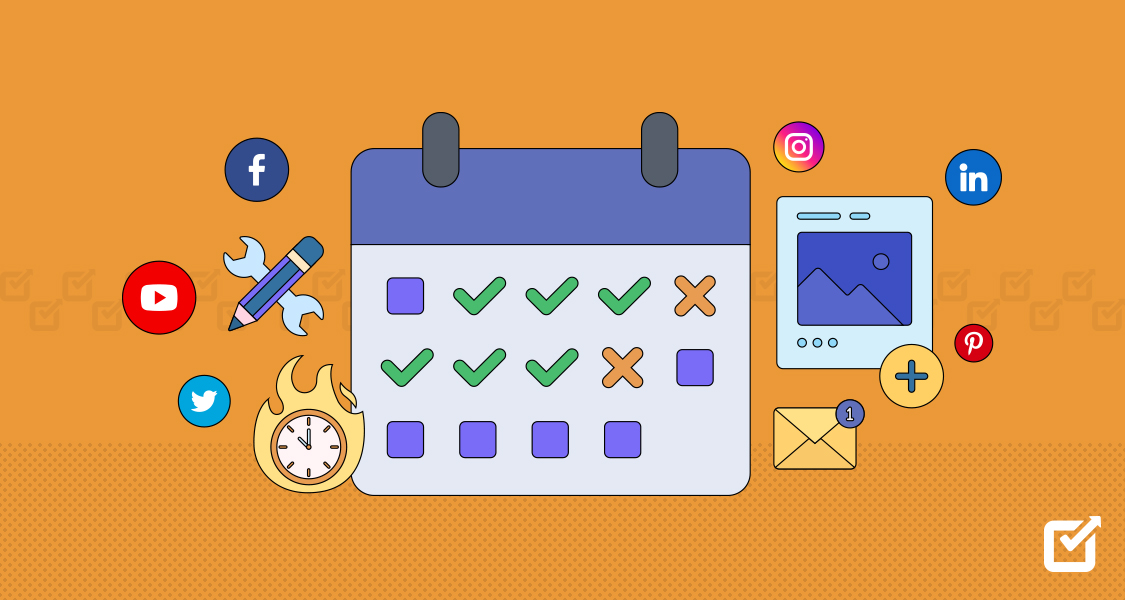

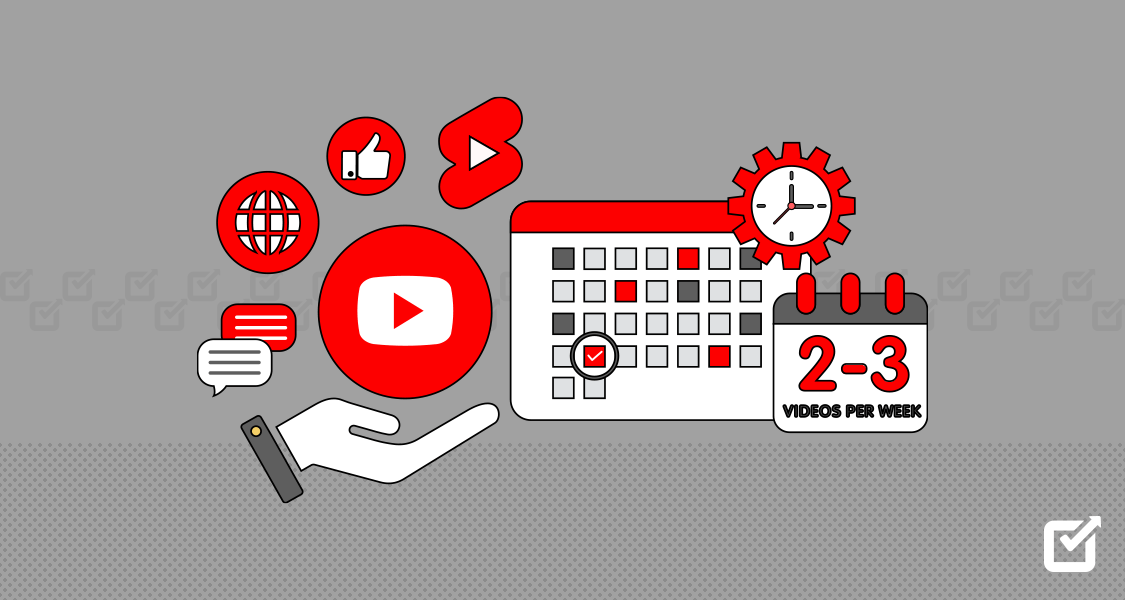

1 comment
Bridger Anderson
Amazing! As a social media manager, staying organized and planning content in advance is crucial, and these tools are essential in streamlining the process.